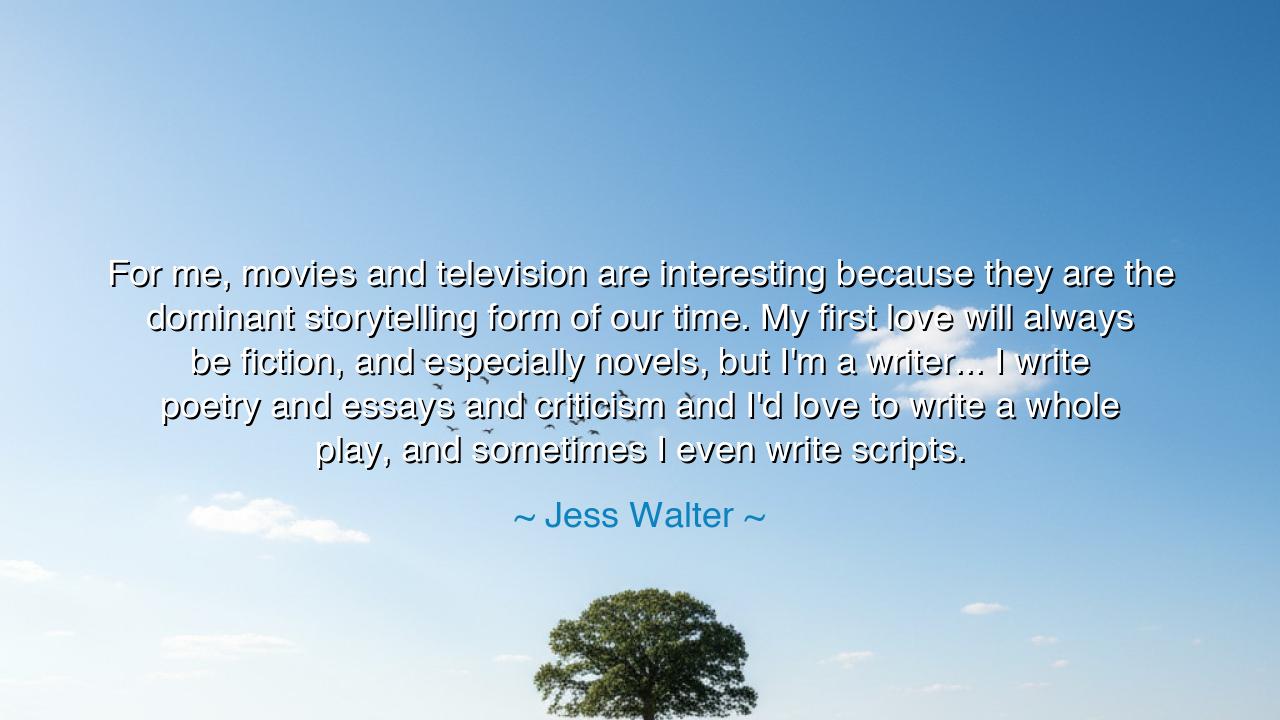
For me, movies and television are interesting because they are
For me, movies and television are interesting because they are the dominant storytelling form of our time. My first love will always be fiction, and especially novels, but I'm a writer... I write poetry and essays and criticism and I'd love to write a whole play, and sometimes I even write scripts.






Listen well, O seekers of wisdom, to the words of Jess Walter, who speaks of the eternal dance between storytelling and the evolving forms through which it is expressed: “For me, movies and television are interesting because they are the dominant storytelling form of our time. My first love will always be fiction, and especially novels, but I’m a writer... I write poetry and essays and criticism and I’d love to write a whole play, and sometimes I even write scripts.” In these words, Walter reveals the essence of the artist’s journey—the ever-shifting nature of creation, the adaptability of the artist, and the power of the written word in all its many forms.
Let us first turn to the ancient bards who were the masters of storytelling in their time. They weaved their tales of heroes and gods, their voices resonating through the mountains and valleys of their lands. Yet, they were not bound to a single medium; their stories took shape in oral tradition, sung in song, inscribed on scrolls, and painted on the walls of caves. The bards were writers at their core, for they knew that storytelling transcends form—it is the spirit of the story itself that matters, not how it is told. Walter’s words echo this ancient truth, for he, too, recognizes that the medium of film and television may be the dominant form of storytelling today, but it is the written word—in its myriad forms—that remains the heart of all creation.
Consider the great authors of history, like Homer, whose Iliad and Odyssey live on today, though the methods by which they were first shared have long since passed. Homer did not bind himself to a single format of expression, for his stories were spoken aloud, passed from one generation to the next. It is not the form of the story, but the essence of the tale that survives. Jess Walter, like Homer, understands this deeply. He speaks not of the dominance of television and movies, but of the shift in how the world now consumes stories. For in this modern age, the screen may be the dominant vessel, but the novel, the poem, the essay, and the play still hold the same power as they did in ancient times.
In Walter’s work, we find the story of the modern creator, the one who navigates the changing tides of storytelling while remaining rooted in the classics. Like Virgil, who honored the tradition of Homeric poetry yet adapted it for his own time with the Aeneid, Walter is a bridge between past and present. His desire to write poetry, essays, and even a play shows his respect for the full range of literary forms. And yet, he is not above embracing the new, as he acknowledges the importance of movies and television in modern culture. These forms may seem fleeting compared to the immortal words of a novel, but they too are powerful vessels for the transmission of truths, emotions, and ideas.
This duality, this tension between the old and the new, teaches us a profound lesson. The world is ever-changing, and the forms of art evolve to meet the needs of each generation. Walter teaches us that to be a true artist, we must not cling to one medium but be fluid, able to adapt, to create, and to share our voice in whatever form speaks most powerfully to the people of our time. Movies and television, though they may not have the longevity of a novel, possess their own kind of power, able to reach millions in a single moment, to move the heart and mind in ways that the printed word cannot. In this, Walter’s perspective offers a vision of balance—the ability to honor tradition while embracing the new, to use whatever tools are at our disposal to tell stories that matter.
Reflect, O seekers, upon your own creative journeys. How often do you resist the new because you are bound to the old? How often do you cling to what you know because it is safe, familiar, and comforting? Walter’s words encourage us to be open to the changing tides of our time, to see the value in each form of expression, whether it be film, television, poetry, or fiction. Each has its own rhythm, its own truth, and its own power to touch the soul. As artists, we must learn to adapt, to evolve, and to embrace the forms that speak to us, just as Homer adapted his stories to the ever-changing world of his time.
Thus, the lesson is clear: do not cling too tightly to any one form, for the true artist is not defined by the medium but by the message. Jess Walter reminds us that while the modern world may be dominated by the visual, it is the written word—in whatever form it takes—that will always be the foundation of storytelling. In your own life, seek not to be bound by tradition, nor by the limitations of the present, but embrace the full spectrum of expression. Whether you write with pen and ink, speak on a stage, or tell your story on a screen, remember that it is the truth within you that matters most. Adapt to the world as it changes, and in doing so, you will find the voice that is uniquely yours.






AAdministratorAdministrator
Welcome, honored guests. Please leave a comment, we will respond soon